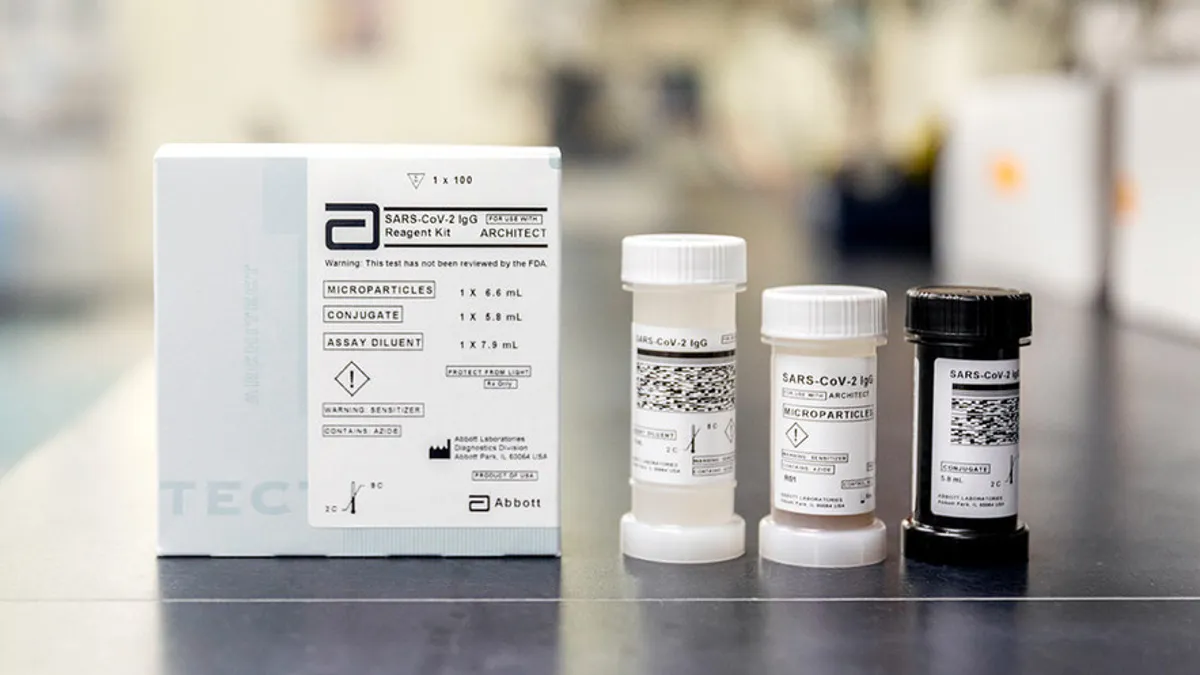Dive Brief:
- Abbott is set to begin shipping a new blood test Thursday to detect antibodies indicating a person has been infected with the novel coronavirus.
- The announcement comes on the heels of FDA granting emergency use authorizations to Chembio Diagnostics and Ortho Clinical Diagnostics for antibody tests. Previously, a small biotech called Cellex was the sole serology test available to have received an EUA. Like BD and other companies, Abbott is launching the test under FDA's diagnostic test policy unique to the COVID-19 public health emergency. The company said it plans to file an EUA request and will seek a CE mark.
- Abbott expects to distribute nearly 1 million tests this week to U.S. customers and 4 million by the end of the month, aiming to increase to 20 million tests in June. At present, the test is limited to detecting a single type of antibody and runs on Abbott's Architect i1000SR and i2000SR instruments. But the company plans to expand the devices that can process the test and the scope of the antibodies it assesses.
Dive Insight:
Broad antibody, or serology, testing could give the U.S. a better picture of how many people have already been infected with the novel coronavirus and who may have immunity, making it a key part of many outlines to re-opening the country.
The company's Wednesday's announcement also noted it could help in developing treatments.
The FDA has allowed test makers meeting certain conditions laid out in a March guidance to market antibody tests without first undergoing regulatory review. Commissioner Stephen Hahn said in an update last week over 70 test developers had told the agency they had serological tests available.
But public health officials have made efforts to cool near-term expectations on the category of testing, noting many antibody tests may not be very accurate and require more validation before wider rollout.
Brett Giroir, the Trump administration's coordinator for coronavirus diagnostic testing, said last week the FDA, CDC and NIH are working to validate some of the COVID-19 antibody tests already released.
Abbott's test detects an antibody known as IgG, a protein produced later during the course of infection and could be present for months or years after recovery, the company noted. Another antibody, IgM, which Abbott's test is not yet equipped to detect, may signal more recent exposure. By comparison, Cellex, Chembio, Ortho and BD's tests all detect both IgG and IgM.
Ortho Clinical Diagnostics began distributing its test to high-priority areas under FDA's guidance April 3 and plans to manufacture "several million" of the tests in the next month. The company said its automated instruments can process 150 tests per hour.
Chembio Diagnostics said its test runs on a point-of-care device that can provide antibody readings within 15 minutes.
While the new Abbott tests are able to run on 2,000 of the associated Architect instruments in the U.S., Abbott said it plans to expand the test for use on its new Alinity platform. The Alinity line of machines in Abbott's core laboratory business have been one of its most mentioned growth drivers in recent quarters, alongside its mitral valve repair technology and continuous glucose monitor for people with diabetes.
It's the third diagnostic test Abbott has launched addressing the pandemic. The first was a diagnostic test that runs on its high-throughput m2000 system; the second was a rapid molecular test that runs on a point-of-care device.
Despite being one of the diagnostic makers with the broadest U.S. footprint, the company has still faced criticism regarding scale-up of its testing. The Trump administration said many of Abbott's high-throughput machines are not being used at full capacity, and the rapid point-of-care tests are not yet widely available.
Abbott is slated to report earnings Thursday before the markets open. It will be Robert Ford's first earnings call as CEO.
With many commercial test kits and lab-developed tests to detect the active virus now having FDA's emergency use authorization, industry focus is turning to antibody testing, alternative sampling methods like using oral fluids, as well as at-home tests.
Comments from FDA late Tuesday suggested the latter remains a challenge.
"We are actively working with developers toward the goal of authorizing EUAs for home use tests once appropriate validation has been completed," the agency wrote in a daily coronavirus update. But how accurately individuals can collect specimen at home, and how well that specimen can be preserved under hard-to-control transport conditions remain challenges that must be overcome.
"Specimen stability and shipping conditions are still of concern," FDA wrote.











